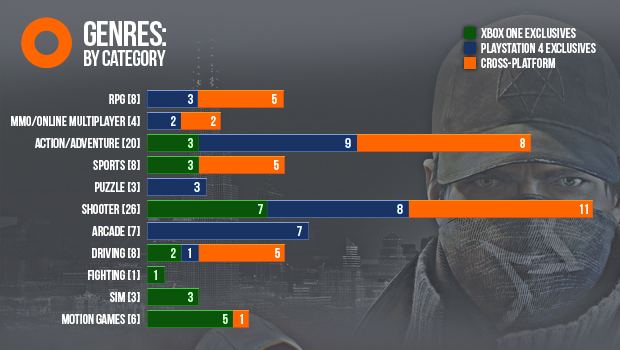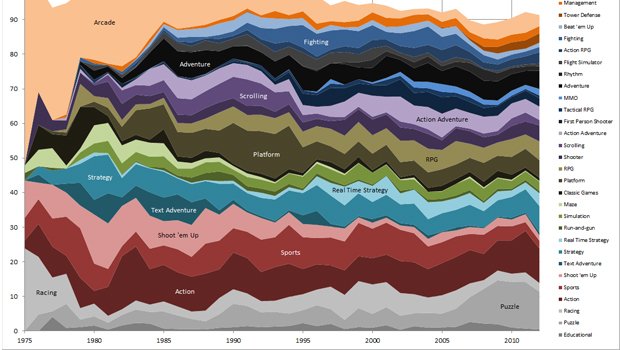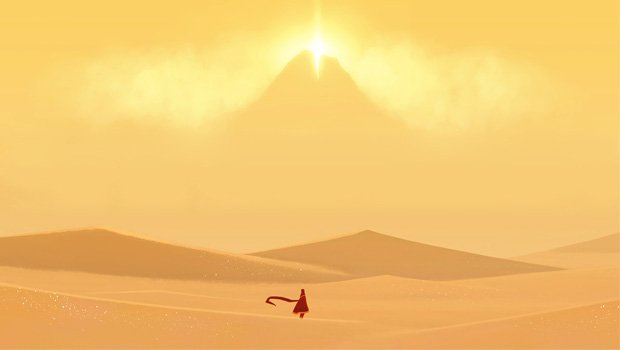Developers agree: genres are an outdated mess
“I think genres should die,” American McGee told me. I'd asked him and a swath of similarly situated developers about genres, and what genres mean, and whether there's really any use for genres any more--and while McGee had one of the most colorful responses, he certainly wasn't alone in his sentiment. And even though their positions on the matter fluctuated from abolishment to tweaking, there was a consensus across the board: video game genres, as they are right now, don’t do the medium justice.
The problem: there’s no consistency among the genres. Every other artistic medium has genres that consistently deal in the emotional value of the piece. Drama, comedy, romance, thriller--the audience knows at least the family of emotion they’re going to be feeling when entering a movie. Video games? Matt Zagurak, the lead writer of The Mighty Quest for Epic Loot, threw in his two cents, saying that video game genres just aren’t consistently describing the same thing across the board. “‘Action-adventure,'" he said, "is a vague promise about content and emotional benefit, ‘first person shooter’ or just ‘shooter’ is a basic but very concrete description of the root gameplay mechanic of the game, ‘strategy’ refers to a skillset to be tested, whereas ‘Free to Play’ refers to a business model.”

Some are based on mechanics, some are based on emotion, and like Matt Zagurak said, some are just about the business model. Gears of War and The Last of Us are in the same genre, yet I would recommend the interactive narrative Gone Home to somebody who enjoyed the Last of Us before Gears of War. Why? Because Gone Home and The Last of Us share an emotional state of mind--they transport the player to the same place. That's as opposed to the put-bullets-in-the-enemy commonality of the third-person shooter genre. Shouldn't the genre allow for this nuance?
How did we get here? Well, organic evolution seems to be the primary culprit. As Greg Kasavin puts it, their “definitions and terms change and evolve as people continue the conversations about games and as games themselves change.” Yet we’re the only industry “where very few genres maintain significance for more than a decade.” Kasavin references shoot-’em-ups, and even adventure games here. And it’s true, the term action-adventure holds little significance to anybody at this point. Steve Gaynor, of The Fullbright Company, chimed in. “We’re always just waiting for the next big innovation within a genre that will change how we play,” he says, “or the next new type of game that there’s no name for yet.” What a terrible construction for a genre system. We wait for something to break our rigid structure so that we can create an entire genre around that specific game. Then when something even newer doesn’t fit we either square-peg-round-hole it or we make yet another genre. At what point will we have so many niche genres that the system becomes pointless?
And that's to say nothing of the ultra-ambiguous genre known as "indie." It’s a stretch to find anything similar to the games of this genre beside the fact that they weren’t developed by one of the big name studios. Greg Kasavin of Supergiant Games put it best, “Even though games I work on benefit from being labeled this way...I would ban the term ‘indie’ as a genre because as this point it’s about as meaningful as ‘alternative’ was to music in 1998. It almost feels like we’re down to maybe 15 games released a year that don’t qualify as ‘indie’.” The Indie genre doesn’t inform anything now, it just points towards production value rather than any content that the game itself has.

Take a look at the graph above (full size here). It represents video game genres across the years. Maze, management, scrollers, run-and-gun, all meaningless now. Once a type of game goes out of style, so does the genre. Now we have MOBA, rougelike, interactive story, survival horror--these all have popped up because we just don’t know where to put the seminal game of that genre. When will these go out of style? When just “interactive story” not be enough to cover the breadth of titles under it.
We’re getting bogged down by old categories from when we were nowhere near the limits of our medium. By no means are we near those limits now, but while we still have a manageable library of games to deal with, we should think about a reorientation around a classification system that is actually useful. Not only will this help us within the industry, but it will help the industry as a whole. Jenova Chen, co-founder of thatgamecompany, thinks that good genres are crucial for games to become a mainstream media. “[Video games] need to have coverage of all kinds of emotions and needs of the mass audience. When people think about needs, they think about emotions, they don’t think about a technical term.” He went on to say: “In the end, we ask people, ‘are you a gamer or not?’ We don’t ask people ‘are you a film watcher or not?’ Because we enter with the assumption that no matter what mood you’re in, there’s a film you can watch.”
Sign up to the GamesRadar+ Newsletter
Weekly digests, tales from the communities you love, and more

Jenova Chen also placed the emotion of a game over its mechanic. And while it makes sense that emotion needs to play a much bigger role in the definition of a game, we must still include the mechanic of the game. It’s kind of our definition right? One of Greg Kasavin’s responses comes to mind, “I think video games are defined by only two characteristics: that they are electronic and that they are in some way interactive. Other than that, the medium is formless, and that’s a great strength rather than a weakness.”
Since our medium is so incredibly broad, there needs to be a genre system that adequately encapsulates that. Film watchers and book readers have only one way to approach their medium, we have multiple. First stab at it: The Game, what its emotion is, what its gameplay is. The Last of Us: Dramatic, Third-Person Shooter. Gone Home: slice of life, discovery, interactive fiction. Project Spark: Creation, achievement, world building. Does it work? Sure gives me more info, and more categorization options.
So let's get this conversation started. As consumers how do we feel about genres? They've been with us since the beginning, but is now the time to update and evolve yet again? As usual, leave a comment below and let's see where we stand.
Zach was once an Associate Editor for Future, but has since moved into games development. He's worked at EA and Sledgehammer Games, but is now Narrative Director on League of Legends and Valorant at Riot Games.


